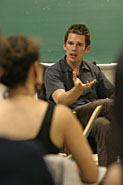State of Grace
Actor Ethan Hawke talks about his writing career to Religious Studies class Soul and Soul Music
Ethan Hawke started writing partly because he was so bored he didn't know what to do with himself.

Owen Egan
The thirty-two-year-old actor (Dead Poets Society, Gattaca, Waking Life) was in Montreal this summer to film Taking Lives. Professor Norman Cornett of the Faculty of Religious Studies invited Hawke to talk to his class, Soul and Soul Music, about his second novel. Ash Wednesday is a love story and a road trip that explores different approaches to time, the complexity of understanding others, and religious beliefs in a mix of vulgarity and ideology. The book alternates voices, those of Jimmy, a party-hard army boy obsessed with sports and his '69 Chevy Nova, and Christy, a pregnant, contemplative, chain-smoking beauty.
Hawke's writing sprung from the tedium of being perpetually on call during filming. Captive in his hotel room, "One day the first chapter erupted out."
Writing Ash Wednesday took five years of sporadic work that he balanced with his acting career, his marriage (to actor Uma Thurman) and his two young kids.
"I wanted to be able to talk of spiritual crisis in a way that didn't feel like a self-help book, that wasn't preachy. One way to do that was with Jimmy, who has a limited vocabulary. It's difficult to write anything that smacked of religion coming out of his mouth."
Writing is quite different from Hollywood movie acting. (For starters, Hawke pointed out that if a book sells 100,000 copies, it's a bestseller; if a movie draws only 100,000 people, it's a flop.) Yet his acting experience informs his writing. For instance, he'll set up a scenario then let the characters rip -- like a controlled improv, he said.
And unlike the linear medium of film, literature can easily convey the past as well as a character's silent thoughts. The fun about writing a novel is it's clear how memories can have an impact in a specific manner, Hawke said. In Ash Wednesday, characters' thoughts jump from past to present to future in a heartbeat, continually spinning in time. "It's a device I may overutilize," Hawke said, but it reflects people's experience. "You stutter, you find yourself in this moment and think how did I get here?"
He's not one for nostalgia. "We fool ourselves that the past is so wonderful," Hawke said, but we forget that "the present is hard; you don't know what's next."
Hawke cites influences as disparate as Beat poet Allen Ginsberg and Catholic scholar Thomas Merton. ("His great skill was in being so open-minded," Hawke says.) During Hawke's teen Beatnik phase, his Catholic stepfather brought him Grace Beats Karma by Neal Cassady. Hawke has been intrigued by grace, and its role in our culture, ever since. Ultimately, he said, "grace is the ability to accept change."
Notions of grace weave with those of death in his book. Getting married to Uma Thurman was the first time Hawke contemplated the idea of "till death do us part." (His Buddhist father-in-law, Columbia professor Robert Thurman, wanted him to take that line out. "You should love her for centuries!" he had railed.) [Recent rumours of Ethan and Uma's splitting up have yet to be confirmed by the Reporter.] "Ash Wednesday is, to me, about carrying death with you every day. Every breath is a gift."
Hawke wishes he had completed a degree at Carnegie-Mellon University, where he studied for two years, but said that had he finished college he might never have written that first novel, The Hottest State. "I had an internal motivation to take responsibility for my education."
Not that producing a novel was without its fears. When it came out he said, "I thought I'd die."
"Because I was a young actor I knew I'd be tarred and feathered and ridiculed, but that wasn't a good reason to not do it," he said. "I think you have to have something to say and not care if anyone hears it."
